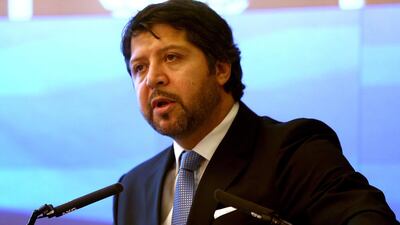ISLAMABAD // Afghan and Taliban representatives will meet again after landmark through-the-night talks aimed at ending the militants’ 13-year insurgency, Pakistan said on Wednesday.
A delegation of the Afghan High Peace Council (HPC), the body tasked with opening negotiations, met the Taliban in the town of Murree, a hill station north of Islamabad.
Pakistani prime minister Nawaz Sharif hailed the meeting as a breakthrough, though the Taliban show no sign of easing up on their bloody summer offensive, launching two suicide attacks in Kabul on Tuesday as talks were about to get under way.
Few details were released about what was discussed, but a foreign ministry spokesman said the talks lasted through the night, concluding at suhoor.
“The participants exchanged views on ways and means to bring peace and reconciliation in Afghanistan,” the Pakistani foreign ministry said, adding that the two sides had agreed to approach the talks with “sincerity and ... full commitment”.
“The participants agreed to continue talks to create an environment conducive for [the] peace and reconciliation process.”
US and Chinese representatives also attended, the ministry said, adding that the next round of talks will be held at a “mutually convenient date” after Ramadan.
Several informal meetings have been held in recent months between Taliban representatives and Afghan officials and activists.
But the talks in Pakistan, led on the HPC side by deputy foreign minister Hekmat Khalil Karzai, are seen as a significant step.
It is the first time Kabul has publicly acknowledged that someone as senior as a government minister was talking directly to the Taliban – though some earlier meetings were shrouded in secrecy, so it was not entirely clear who took part.
The UN mission in Afghanistan and former president Hamid Karzai welcomed the talks.
Rahimullah Yousufzai, a Pakistani journalist and Taliban expert, said it was an “important development” but warned that the process was still at a very early stage.
“We need to see two [or] three elements: What is the peace plan? Have the different Taliban factions agreed to these talks?” he said.
Divisions within the Taliban movement, particularly between young battle commanders in Afghanistan and older leadership figures abroad, have helped to hamper peace efforts over the years.
There has been no confirmation that anyone from the Taliban’s political office in Qatar, set up in 2013 to try to facilitate talks, attended on Tuesday. However, Mr Yousufzai said his understanding was that three Pakistan-based Taliban cadres took part.
The Taliban issued a rather opaque statement on Wednesday, saying the “political office has full authority ... to hold or stop negotiations whenever and wherever they feel fit”.
A spokesman refused to clarify further but neither he nor the statement made any criticism of the Murree meeting.
Other factors may be feeding the militants’ caution, including the status of their leader Mullah Omar, about whom rumours of ill-health and even death regularly emerge, and complex relations with Pakistan.
Afghan officials have long accused their eastern neighbour, which supported the Taliban during the movement’s 1996-2001 rule, of using the militants to further its own interests in the country specifically as a hedge against Indian influence.
When the US-led invasion ousted the militants in 2001 many of their leaders took refuge in Pakistan and still live there, closely monitored by intelligence agencies.
Mistrust of the Pakistanis extends to the Taliban as well, with some elements accusing Islamabad of trying to turn the peace process to its own advantage.
One commander said on Wednesday that the delegation at the talks was a “Pakistan-made group” who had “no influence in the Taliban leadership”.
Even if substantive negotiations get under way, talks alone will not necessarily bring an end to fighting on the ground in Afghanistan.
The Taliban’s annual summer offensive is in full swing, with twin suicide attacks in Kabul on Tuesday, one targeting a NATO convoy and one an Afghan intelligence office, highlighting the precarious security situation.
Nato ended its combat mission in Afghanistan at the end of December, leaving Afghan forces to battle the resurgent Taliban on their own.
Stretched on multiple fronts and facing record casualties, Afghan forces are struggling to rein in the militants, and there are persistent fears that ISIL is growing in influence in the country’s restive south-east.
* Agence France-Presse

